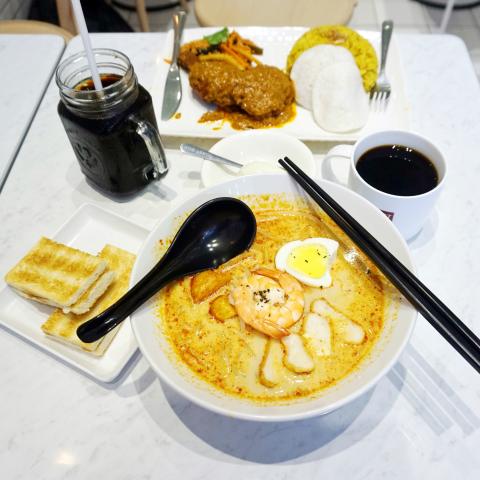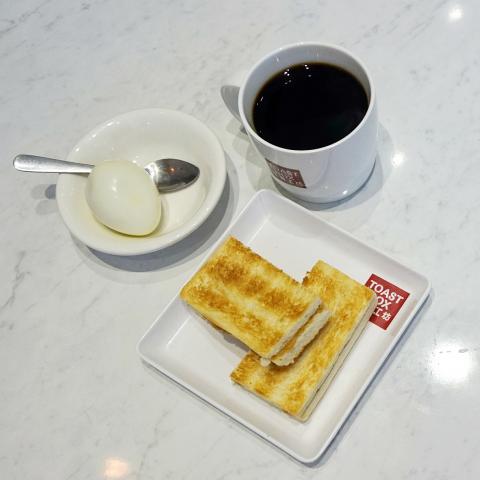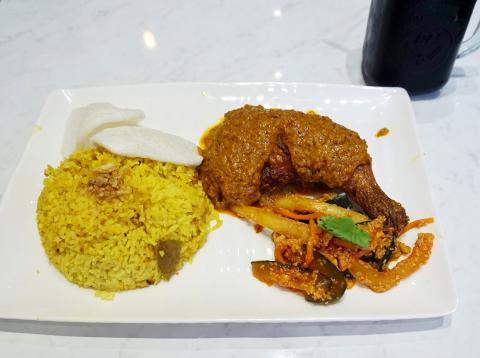Last week, a friend and I celebrated Malaysia’s Independence Day by getting ridiculously dressed up (ball gown and dress shirt) and eating at Toast Box — an idea he had from orchestrating a very fancy Valentine’s Day celebration at White Castle, a fast food joint in the US, a few years ago.
For nearly two years, I had been searching for a decent Malaysian restaurant in Taiwan, one with char kway teow, or stir-fried rice noodles, that would rival my grandma’s. Instead, I found plenty of bland and watered-down dishes that lacked the necessary herbs and spices — an insult, really, to the rich culinary tradition of the Malay peninsula from which my family hails.
That is, until Singaporean food chain Toast Box opened an outpost in Xinyi District (信義) earlier this summer. The interior is almost identical to the many Toast Box outlets in Singapore — a revamped version of the peninsula’s iconic 1960s coffee shops with antique rugs, tiled walls and decorative knick-knacks stacked atop wooden shelves.

Photo: Dana Ter, Taipei Times
For decades, the morning ritual in Singapore and Malaysia meant putting on slippers and heading to your local coffee shop for a buttery kaya (coconut jam) toast with teh tarik (pulled milk tea) or kopi o (sugary black coffee). This was the time to catch up and gossip with friends. Today, that concept hasn’t changed much, though breakfast is accompanied by the obligatory food picture retouched with a rustic filter.
We go for a breakfast staple, the traditional kaya toast set (NT$135), which comes with a hard-boiled egg and a choice of beverage. I choose the kopi o. The bread is brown and crisp, though it could have been a little more toasted. The best part is the thick slab of butter and kaya which melts in the mouth. The hard-boiled egg, though nicely done, is a little quizzical, as kaya toast is usually served with gooey, soupy soft-boiled egg for dipping. I quite fancied the kopi o, though, especially its aromatic and roasted scent and slightly sweet taste. But be warned: this set is tiny and will not suffice as an entire meal.
The Singapore laksa (NT$230) — rice vermicelli soaked in a coconut curry soup and mixed with fish cakes, bean curd puffs and shrimp — is incredibly authentic. A blend of Chinese and Malay cuisines, the curry laksa was traditionally eaten by the Peranakans — descendants of 17th-century Chinese immigrants to the Malacca Strait. The coconut milk in the soup is highly discernible. Though I appreciated the creaminess and saltiness of the curry, it could have benefited from a little more sambal, or chili sauce. Other than that, the ingredients are quite spot on. The fish cakes and bean curd puffs are chewy, the shrimps adding a savory dimension. I would have liked some coriander garnishing, though, just to add more of an herbal flavor and also to give the dish some green, or perhaps a dash of lime would do.

Photo: Dana Ter, Taipei Times
We also sample the nasi biryani with chicken rendang (NT$250). The dish, which is a Malay rendition of the traditional Indian biryani (rice with meat and vegetables), is a flavorful mix of spicy and savory. The chicken skin is crisp and slightly burnt, the inside tender and chewy, while the sauce — a blend of coconut milk and ground spices including turmeric leaves and chili — is intensely aromatic and pairs well the turmeric rice. All of this is served with a side of acar, or pickled vegetables mixed with a spice paste and topped with sesame seeds and ground peanuts, which is sweet and savory at the same time.
Verdict? Other than a few discrepancies, Toast Box delivers true Malaysian and Singaporean cuisine, and I can gladly say that I’m not deprived anymore.

Photo: Dana Ter, Taipei Times

Last week, on the heels of the recall election that turned out so badly for Taiwan, came the news that US President Donald Trump had blocked the transit of President William Lai (賴清德) through the US on his way to Latin America. A few days later the international media reported that in June a scheduled visit by Minister of National Defense Wellington Koo (顧立雄) for high level meetings was canceled by the US after China’s President Xi Jinping (習近平) asked Trump to curb US engagement with Taiwan during a June phone call. The cancellation of Lai’s transit was a gaudy

Following the shock complete failure of all the recall votes against Chinese Nationalist Party (KMT) lawmakers on July 26, pan-blue supporters and the Chinese Communist Party (CCP) were giddy with victory. A notable exception was KMT Chairman Eric Chu (朱立倫), who knew better. At a press conference on July 29, he bowed deeply in gratitude to the voters and said the recalls were “not about which party won or lost, but were a great victory for the Taiwanese voters.” The entire recall process was a disaster for both the KMT and the Democratic Progressive Party (DPP). The only bright spot for

From Godzilla’s fiery atomic breath to post-apocalyptic anime and harrowing depictions of radiation sickness, the influence of the nuclear bombings of Hiroshima and Nagasaki runs deep in Japanese popular culture. In the 80 years since the World War II attacks, stories of destruction and mutation have been fused with fears around natural disasters and, more recently, the Fukushima crisis. Classic manga and anime series Astro Boy is called “Mighty Atom” in Japanese, while city-leveling explosions loom large in other titles such as Akira, Neon Genesis Evangelion and Attack on Titan. “Living through tremendous pain” and overcoming trauma is a recurrent theme in Japan’s

As last month dawned, the Democratic Progressive Party (DPP) was in a good position. The recall campaigns had strong momentum, polling showed many Chinese Nationalist Party (KMT) lawmakers at risk of recall and even the KMT was bracing for losing seats while facing a tsunami of voter fraud investigations. Polling pointed to some of the recalls being a lock for victory. Though in most districts the majority was against recalling their lawmaker, among voters “definitely” planning to vote, there were double-digit margins in favor of recall in at least five districts, with three districts near or above 20 percent in